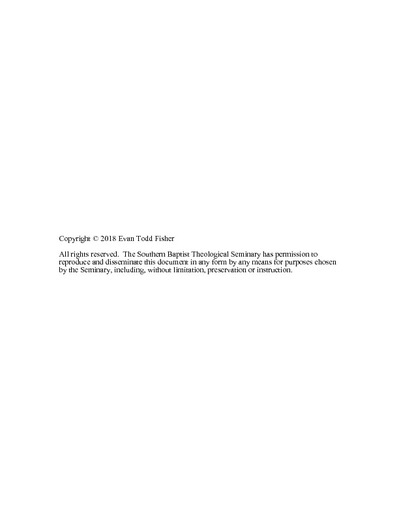| dc.contributor.advisor | York, Hershael W. | |
| dc.contributor.author | Fisher, Evan | |
| dc.date.accessioned | 2019-06-05T17:53:29Z | |
| dc.date.available | 2019-06-05T17:53:29Z | |
| dc.date.issued | 2018-11-26 | |
| dc.identifier.uri | http://hdl.handle.net/10392/5807 | |
| dc.description.abstract | This dissertation argues that James Montgomery Boice, upon becoming pastor of Tenth Presbyterian Church in Philadelphia, remained in the liberal United Presbyterian Church USA for the first twelve years of his pastorate in order to reclaim the denomination for orthodoxy. His efforts toward reclamation are principally grounded through the content of his preaching and writing, which was affected by this rhetorical situation.
Chapter 1 states the thesis, which attempts to answer two major questions that arise from this era of Boice’s ministry: Why remain in a liberal denomination when conservative options were available? Why does the content of Boice’s rhetoric contain large amounts of references to liberal theology?
Chapter 2 describes the rise of theological liberalism in northern mainline Presbyterianism commonly known as the Fundamentalist-Modernist controversy. This portion of the denomination’s history provides a picture of its theological status when Boice became pastor of Tenth in 1968. The way some conservatives responded to the controversy impacted Boice’s own response to liberalism.
Chapter 3 examines the personal correspondence and published articles of Boice delineating his opposition to theological liberalism and desire to remain within the UPCUSA to be an advocate for orthodoxy.
Chapter 4 describes the major influences in Boice’s life that helped shape his desire to stay within an errant denomination to strengthen what remains rather than abandon it. These influences are Donald Grey Barnhouse, Harold John Ockenga, Robert J. Lamont, and John Gerstner.
Chapter 5 provides examples from Boice’s sermons and writings during the time period germane to the dissertation (1968-1980). The sermons are from his Sunday morning series on Genesis, John, and Philippians and organized around topics pertaining to theological liberalism that appear in each series. These sermon and book excerpts illustrate Boice’s rhetorical efforts against heterodoxy.
Chapter 6 explains why Boice eventually was forced to leave the UPCUSA. Despite his desire to remain within it, the denomination began enforcing legislation that would require Boice to lead his church in a way that would violate his conscience.
Chapter 7 explores the impact Boice’s situation had on his rhetoric. The chapter outlines the arguments of Lloyd Bitzer, the seminal theorist in the field of rhetorical situation. An opposing view argued by Richard Vatz is described next, followed by the intermediate view of Scott Consigny. All three views consider the degree of causation that occurs between situation and rhetoric. The chapter argues for the theory put forth by Consigny that situation does not determine why a rhetor speaks, but rather helps to shape what he or she speaks.
Chapter 8 serves as the conclusion which assesses whether Boice was successful in his endeavors to reclaim the UPCUSA for orthodoxy. The approach of Boice to remain in an errant denomination as long as one can is posited as an exemplary approach for those in similar ministry situations. | en_US |
| dc.subject.lcsh | Boice, James Montgomery, 1938-2000 | en_US |
| dc.subject.lcsh | Tenth Presbyterian Church (Philadelphia, Pa.) | en_US |
| dc.subject.lcsh | Modernist-fundamentalist controversy | en_US |
| dc.subject.lcsh | Presbyterian Church--United States--Doctrines--History--20th century | en_US |
| dc.title | Strengthen What Remains: The Rhetorical Situation of James Montgomery Boice | en_US |
| dc.type | Electronic dissertation | en_US |
| dc.type | Text | en_US |
| dc.contributor.committee | Vogel, Robert A. | |
| dc.contributor.committee | Haykin, Michael A. G. | |
| dc.type.qualificationname | Ph.D. | en_US |
| dc.publisher.institution | Southern Baptist Theological Seminary | en_US |
| dc.publisher.department | School of Theology | |

